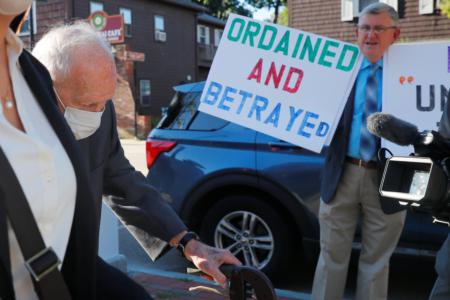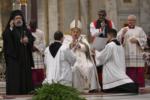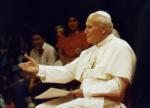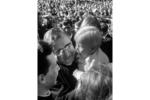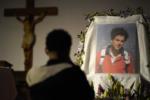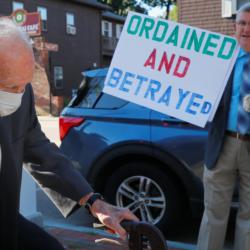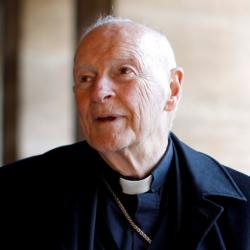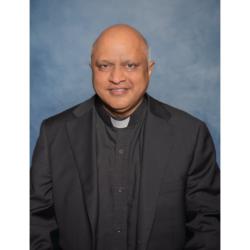Three things
Here are three things to ponder while waiting for the Stanley Cup playoffs to awaken from sabbatical and the Celtics to prove they are not a one-man team.
The Draft
There’s no accounting for taste, especially where it concerns sporting appetites. Hence there’s no explaining the odd obsession with this annual dragooning of college football fodder into the gristmills of the National Football League. Although it could be argued this proves that as a nation we may have too much time on our hands.
It’s been happening every spring since Jay Berwanger became the very first “number one”; plucked by Bert Bell, boss of the Philadelphia Eagles, in 1936. A distinguished scholar from the University of Chicago as well as a gifted scatback, Berwanger chose instead to become a teacher, which indicates how much has changed in the intervening three-quarters of a century. For openers the august University of Chicago no longer plays football.
But the college draft has remained a constant and the infatuation is still growing. In concert with ever conniving and grasping ESPN, the NFL now accords the draft show near Soupey Sunday stature, heresy though that may seem. Where not so long ago the draft was a leisurely Tuesday morning exercise conducted on a telephone hook-up while bored-silly sports scribes gnawed on chicken wings and potato chips it now demands daylong drum rolls leading up to wall to wall analysis by battalions of pundits. Live coverage this year exceeded 18 hours, well more than any of the networks accorded the national political conventions last summer.
Leading this parade is the most improbable of Pied Pipers, the bombastic super football-nerd and unsinkable motor mouth Mel Kiper Jr. whose exercise in self-parody may just be a work of genius in disguise. Every year I am astounded by the nuttiness of the thing and every year I watch. These are lean times. Even the Mel Kipers among us deserve work.
It remains the official policy of this space to desist from any comment, about which teams did or did not do well in this annual turkey shoot, 95 percent of the chattel on the auction block being lads you’ve never heard of let alone seen. The presumption that our resident strawboss, Bill Belichick, conducted the business brilliantly holds. If he did not, his legend will take a hit because this was his first time in the war room without Scott Pioli propping him up.
Boss Bill’s machinations led to more picks being used for trades than for players with a couple of his choices being termed “reaches” by the savants. But when in doubt who should we trust in these matters; the reclusive wizard of Foxborough or old motor mouth. We assume six foot eight inch, 318 pound, Sebastian Vollmer is another Bruce Armstrong until proven otherwise.
And we can further assume Maestro Belichick would never have sprung for that bloated five for one deal the Jets concocted to snare the first-round rights to hotshot Mark Sanchez. For a late blooming, little-known, college quarterback with only 16 games of experience the Boss will pay nothing more than a sixth-round pick.
On class acts
If the Bruins revival has many nice features none surpasses the rise to eminence of the coach, Claude Julien; your basic salt of the earth hockey man. He comes from a distinctive breed, the type of character we used to say you would want next to you in a foxhole. Such references don’t have quite the cachet they once had. But in hockey they still speak to something highly admirable.
The suspicion here persists that this Bruins team is not quite of championship caliber and has played beyond itself all season, entirely a tribute to this coach and his staff. In his two seasons here this has been a dutiful, disciplined, mature team; remarkably so for one having so many youngsters in key roles. It’s a team that makes no waves off the ice and plays with purpose on it. It’s not clear the talent is sufficient. They remain a long shot in these playoffs. But if they don’t go all the way it won’t be because they’ve lacked preparation or direction or lost their cool or been out-coached.
After serving 20 years beating the bushes of hockey’s vast and thankless hinterland -- experiencing only the grand total of 14 games in the NHL with the Nordiques in all that time -- it’s downright joyful to see a constant and faithful character like Julien finally have his hour.
The Bruins, likely, were his last chance. He had failed in Montreal where anything less than Cup contention every year is unacceptable. If such royalty as Guy Carbonneau and Bob Gainey are now adjudged failures what chance did Claude Julien have? He was also deemed a failure in New Jersey although how or why remains mystifying. His team led his conference when he was canned, presumably for failing to meet the fierce expectations of fiery Lou Lamoriello, boss of the Devils.
Two jobs and two strikes and probably only one more chance. Yet he never complained, never faulted anyone, never remarked about the apparent unfairness of it all, nor hinted to the slightest chagrin. It’s the mark of the Centurion and in hockey that commands tremendous respect. Which is why the reaction to his sudden success in Boston is so warm among the lodge brothers of this intensely insular and deeply bonded game. One suspects it will get warmer.
On institutional memory: (Or more precisely, the lack thereof)
The thought is raised by the recent death of two very special sportsmen. Or more precisely, the tepid reaction to the passings of Mark “the Bird” Fidrych and Felix “Doc” Blanchard.
They, of course, had nothing in common coming from different worlds and representing very different attitudes and values to very different generations. But each spoke with a kind of eloquence about the things that were good about the games they played, giving them special meaning. You can’t say that about many chaps.
As a local lad whose works were more recent, “Bird” stirred the greater memories and they were all good even though his story was bittersweet for his time in the sun was too brief. Have the baseball gods no sense of humor? You sometimes wonder.
Bird was a creation of Ring Lardner; a noble innocent, rather too good to be true. If he was a child of the mid-70s, he actually belonged to a simpler time. His great gift was to remind us how joyful just being young and alive and “one with the ball” could be. We needed the lesson. Bird was baseball’s Johnny Appleseed.
Blanchard, on the other hand, was a much more classical hero. He and his stylish backfield buddy, Glen Davis, were the leaders of West Point’s thundering herd of a mighty football team that captured the national imagination in the waning days of World War II and first rhapsodic days that followed.
That “brave old Army team” was called, quite in the spirit of the times, “the Black Knights of the Hudson” and none stood more ram-rod straight than young Doc, out of Bay St. Louis, Mississippi’s St. Stanislaus High. If you were a kid at the time, the Doc seemed chiseled from a rugged bluff in the Badlands.
The affable Davis -- more the epitome of “the Saturday Hero” -- dated Elizabeth Taylor, did his minimum service time, and went on to have good years with the Los Angeles Rams. But Blanchard, to the last the Eagle Scout who bought into the whole package, would have none of that.
Though the top pick in the ’47 draft (by the Steelers), he politely walked away and embarked on a 24 year career in the Army Air Corps which included combat missions in both Korea and Vietnam. At the age of 47, Colonel Blanchard made his last bomber run over Hanoi and Haiphong. Had the army a sharper sense of public relations they would have made the Doc at least a Brigadier General.
The Doc and the Bird! Were they not the glory of their times?
